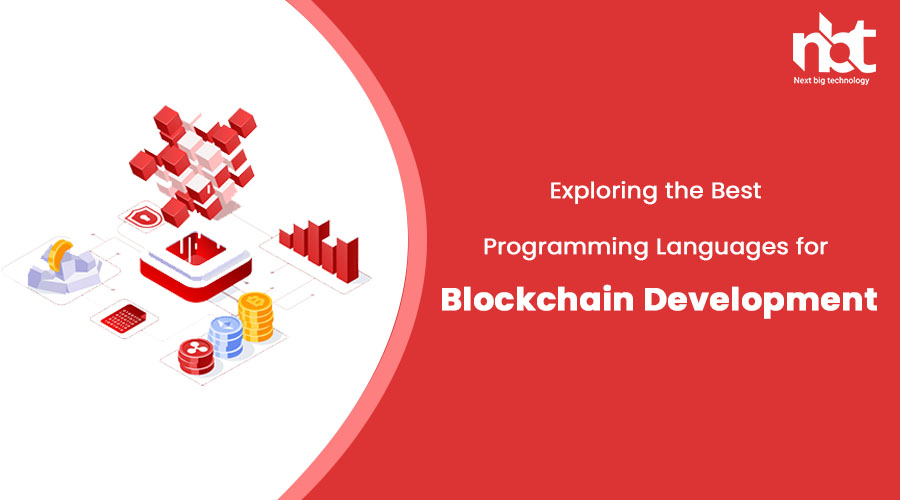Introduction: Blockchain technology has gained widespread recognition for its potential to revolutionize various industries. As developers delve into the world of blockchain programming, they encounter a variety of programming languages specifically designed to build decentralized applications (dApps), smart contracts, and blockchain solutions. In this blog, we will explore some of the best programming languages for blockchain development, highlighting their features, strengths, and use cases.
- Solidity: Solidity is the most popular programming language for developing smart contracts on the Ethereum blockchain. It is a statically typed, contract-oriented language designed to enable secure and reliable execution of decentralized applications. Solidity’s syntax resembles JavaScript and offers features such as inheritance, libraries, and complex data structures. With Ethereum’s widespread adoption, Solidity provides an excellent foundation for building dApps, decentralized finance (DeFi) applications, and non-fungible token (NFT) platforms.
- JavaScript: JavaScript is a versatile and widely used programming language known for its compatibility with web development. With the rise of blockchain frameworks like Ethereum’s Web3.js and Polkadot’s Polkadot.js, JavaScript has become a popular choice for blockchain development. It allows developers to interact with blockchain networks, build decentralized applications, and handle smart contract interactions. JavaScript’s extensive library ecosystem and developer community make it a flexible and accessible choice for blockchain projects.
- Rust: Rust is a systems programming language known for its emphasis on safety, concurrency, and performance. It has gained traction in blockchain development due to its focus on memory safety and prevention of common programming errors. Rust’s ability to write efficient and secure code makes it well-suited for building blockchain protocols, virtual machines, and low-level infrastructure. Projects like the Polkadot network and the Solana blockchain utilize Rust for their core development.
- Vyper: Vyper is a Python-derived programming language specifically designed for writing smart contracts on the Ethereum blockchain. It emphasizes simplicity, security, and readability, making it an excellent choice for developers who prioritize code clarity and auditability. Vyper has a reduced feature set compared to Solidity, focusing on avoiding common pitfalls and security vulnerabilities. It is particularly suitable for building secure and auditable smart contracts on Ethereum.
- Go: Go, also known as Golang, is a statically typed, compiled language developed by Google. Its simplicity, efficiency, and strong support for concurrency make it a popular choice for blockchain development. Go’s performance and low resource consumption make it suitable for building blockchain protocols, decentralized applications, and infrastructure components. Projects like Hyperledger Fabric and Ethereum’s go-ethereum client are implemented in Go.
- C++: C++ is a powerful and widely adopted programming language with a long history of use in blockchain development. Its performance, control over memory, and compatibility with low-level systems make it suitable for building blockchain platforms, core protocols, and performance-critical components. Bitcoin’s reference client, Bitcoin Core, is written in C++. C++ is also used in projects like EOSIO and Litecoin.
- Simplicity: Simplicity is a domain-specific language (DSL) designed for writing smart contracts with a focus on safety and security. It aims to provide a simpler and more verifiable alternative to languages like Solidity. Simplicity’s strong emphasis on formal verification allows developers to mathematically prove the correctness and security of their smart contracts. While still in its early stages, Simplicity shows promise for building secure and auditable smart contracts on various blockchain platforms.
- Java: Java is a widely used programming language known for its scalability, security, and extensive ecosystem. Although it is not the most commonly used language for blockchain development, it has gained traction with frameworks like Hyperledger Fabric and Corda. Java’s enterprise-level capabilities, compatibility with existing systems, and extensive libraries make it a viable choice for building private and permissioned blockchain solutions.
Conclusion: Selecting the best programming language for blockchain development depends on various factors, including the specific use case, platform compatibility, performance requirements, and developer familiarity. Solidity remains the dominant language for building smart contracts on Ethereum, while JavaScript and Rust have gained popularity for developing blockchain applications and protocols. Python-based languages like Vyper provide an alternative for Ethereum smart contract development, while Go and C++ offer performance and control for building blockchain platforms. Languages like Simplicity and Java cater to specific use cases with a focus on security or enterprise solutions.
Ultimately, the choice of programming language should align with your project’s goals, technical requirements, and the expertise of your development team. It’s also worth considering community support, available libraries, and the overall ecosystem surrounding the language. As blockchain technology continues to evolve, new programming languages may emerge, offering innovative approaches to building decentralized applications and blockchain solutions.










